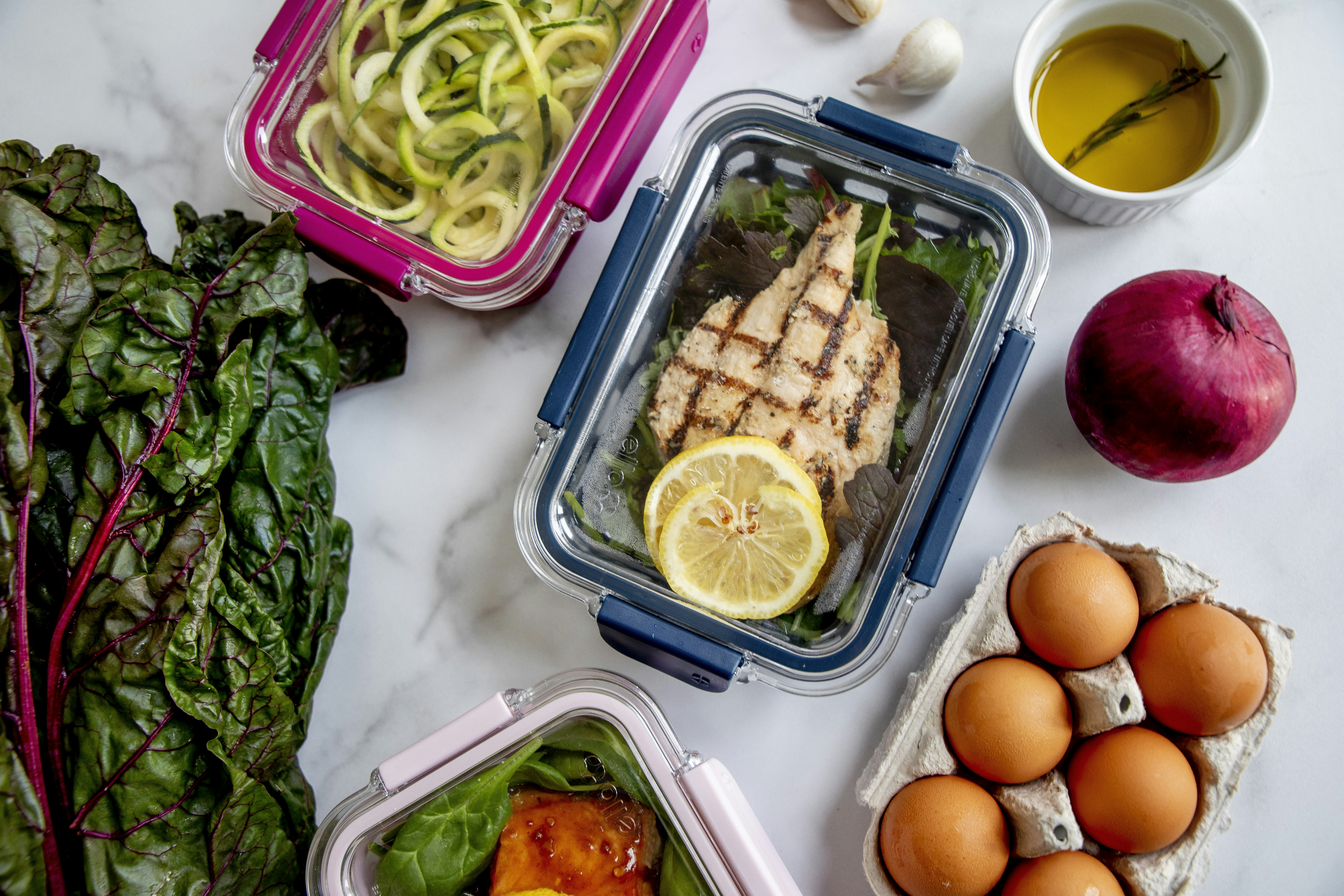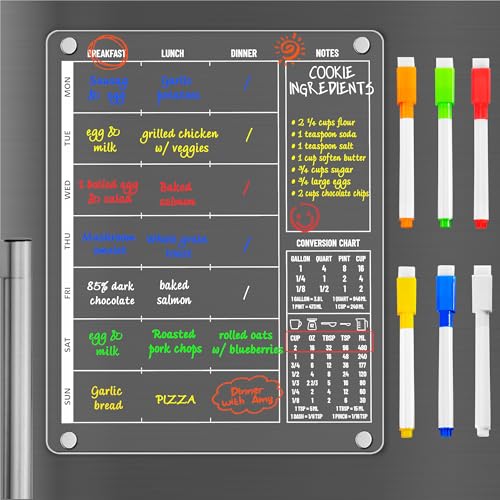Understanding Meal Planning: The First Step to Success
Meal planning serves as a critical starting point for individuals aiming to enhance their dietary habits and overall well-being. At its core, it involves assessing one’s nutritional needs and preferences, which can vary significantly based on lifestyle, age, and health status. A thorough analysis of these factors allows individuals to establish realistic goals that complement their daily routines. For instance, someone with a busy schedule may prioritize quick-prep meals, while another with specific dietary restrictions might focus on options that align with their health requirements.
Developing a balanced menu is essential in meal planning. This involves not just selecting recipes that are nutritious but also ensuring a diverse range of food groups are included. Incorporating a variety of fruits, vegetables, whole grains, and protein sources can prevent dietary boredom and promote better health outcomes. Tools such as food diaries or mobile applications can facilitate this process by helping individuals track their meals and nutritional intake, thus making it easier to identify gaps or areas for improvement.
Creating a weekly schedule for meal preparation is another effective technique. By dedicating specific times for cooking and shopping, individuals can streamline their efforts and reduce the tendency to make impulsive food choices. Additionally, considering time constraints while planning meals can mitigate stress associated with cooking. This proactive approach not only fosters healthier eating habits but also contributes to substantial benefits such as reducing food waste and saving money.
Ultimately, meal planning equips individuals with the necessary tools to make informed decisions about their diets. By emphasizing healthy choices and efficient strategies, it can pave the way towards achieving long-term health goals and sustaining a balanced lifestyle.
Efficient Meal Preparation: Tips and Tricks
Efficient meal preparation significantly enhances the cooking experience, making it easier to enjoy nutritious homemade meals. By adopting specific tools and techniques, individuals can streamline the cooking process and minimize the effort involved.
One effective strategy is batch cooking, which entails preparing large quantities of food in one session. This method not only saves time but also allows for the creation of diverse meal options throughout the week. When choosing a batch cooking day, consider your schedule, and aim for a time when interruptions are minimal. Cooking staples in bulk, such as grains, legumes, and proteins, can form the basis of various meals, providing flexibility and variety.
Another essential practice is to chop and prep ingredients in advance. By organizing your kitchen and dedicating some time to wash, chop, and store vegetables and proteins, you can significantly cut down on cooking time during busy weekdays. Storing prepared ingredients in clear, labeled containers can help maintain organization and prompt easier access when cooking.
Utilizing kitchen gadgets like slow cookers and instant pots can further contribute to efficient meal preparation. These appliances can not only reduce cooking time but also allow for unattended cooking, freeing up your schedule. For instance, a slow cooker can transform a few ingredients into a hearty meal while you focus on other tasks, making it a valuable asset in meal prep. Additionally, consider investing in a sturdy food processor; it can expedite chopping, slicing, and grating, thus saving precious minutes in the kitchen.
Lastly, effective time management during meal prep is crucial. Setting timers for certain tasks can help maintain momentum and ensure you stay on track. Incorporate these tips into your meal preparation routine; over time, you will notice a significant enhancement in your cooking efficiency, leading to more enjoyable meals without the associated stress.
Smart Storage Solutions: Keeping Meals Fresh and Accessible
Effective meal prep extends beyond just planning and preparing; it also encompasses the strategic storage of meals to ensure they maintain their freshness and flavor. Employing appropriate storage solutions is essential for maximizing the lifespan of prepped meals while minimizing food waste. One of the foundational elements of meal storage is the choice of containers. Utilizing airtight containers made from glass or BPA-free plastic not only preserves the quality of food but also helps prevent unpleasant odors from permeating your fridge.
Portion control plays a crucial role in meal prep efficiency. By dividing meals into individual portions, you enable easy access during busy weekday meals and reduce the temptation to consume more than needed. It is advisable to label containers with the meal name and date of preparation, as this practice proves beneficial in keeping track of freshness. Labeling not only facilitates better organization but also encourages mindful eating habits, making the decision-making process less daunting.
Freezer-friendly meals are a valuable component of effective meal prep. Many cooked dishes, such as soups, stews, or casseroles, can be frozen to extend their shelf life. When freezing meals, it is vital to allow them to cool before packaging to prevent condensation, which can lead to freezer burn. Additionally, employing safe defrosting methods, such as moving meals from the freezer to the refrigerator a day in advance, ensures that they remain safe for consumption without compromising texture or flavor.
Organizing the refrigerator and pantry effectively can greatly enhance the meal prep experience. Assign designated shelves or sections for meal-prepped items, which simplifies meal planning during the week. Ensuring that older items are placed in the front encourages their consumption before they spoil, effectively reducing food waste and promoting healthier eating habits across the board.
Integrating Efficient Meal Prep into Your Lifestyle
Incorporating efficient meal prep into your daily or weekly routine is essential for long-term success and can significantly enhance your overall culinary experience. To start, it is crucial to set specific times for planning, prepping, and cooking. This practice allows you to establish a consistent rhythm within your busy schedule, making meal prep a seamless part of your life rather than an additional chore. Consider dedicating a couple of hours during the weekend to plan meals for the upcoming week. Utilize this time not only to choose recipes and create a shopping list but also to engage in the actual preparation of ingredients to streamline your weekdays.
Another effective strategy is to adapt your meal prep to accommodate changing dietary needs or preferences. This flexibility ensures that you remain excited about your meals, promoting adherence to your plans. Keep a variety of ingredients on hand that can be easily mixed and matched to cater to different nutritional requirements. This adaptability can be particularly beneficial for individuals following specialized diets or those who wish to explore diverse culinary options without straying from their dietary goals.
The psychological benefits of meal prepping cannot be overlooked. By engaging in meal preparation, you reduce stress associated with daily cooking decisions, create opportunities for mindful eating, and maintain control over portion sizes. The act of planning and preparing meals encourages a more intentional approach to food, allowing you to make healthier choices that are in alignment with your goals. Moreover, such practices foster a sense of accomplishment and provide a solid foundation for positive eating habits. As you integrate meal prep into your lifestyle, you will likely find that it enhances not just your diet but your overall well-being.

![C CREST [10 Pack] Glass Meal Prep Containers, Food Storage Contai...](https://m.media-amazon.com/images/I/51KtYzS-grL.jpg)
![Freshware Food Storage Containers [36 Set] 16 oz Plastic Deli Con...](https://m.media-amazon.com/images/I/51eOGIEdZYL.jpg)


Leave a Reply